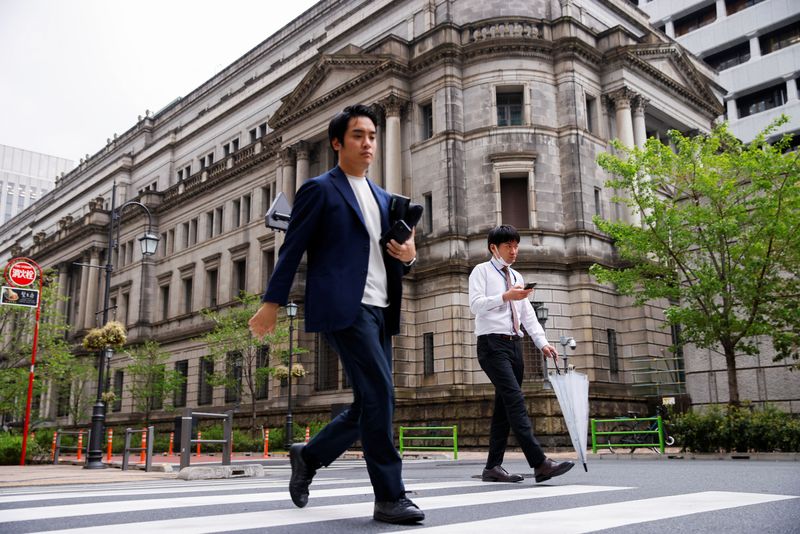By Leika Kihara and Takahiko Wada
TOKYO (Reuters) - The Bank of Japan should raise interest rates at least to 1% to roll back an "abnormally" huge stimulus that is causing unwelcome falls in the yen, said Takeshi Shina, the shadow finance minister of the country's largest opposition party.
The central bank should normalise monetary policy steadily and clarify its intention to do so as its short-term policy rate, currently at 0.25%, is well below levels deemed neutral to the economy, Shina told Reuters in an interview on Thursday.
"The BOJ's mandate is to achieve price stability but that isn't being met, as the huge U.S.-Japan interest rate gap is causing yen falls that push up the cost of living," said Shina, known as a vocal critic of ultra-easy monetary policy.
"The BOJ should keep raising rates to 1% in several stages to roll back an excessive degree of monetary stimulus," he said.
As a member of the lower house's financial committee, Shina has frequently summoned BOJ governors, including incumbent Kazuo Ueda, to parliament for grilling on monetary policy.
His remarks highlight how concern over the demerits of a weak yen will remain a key topic of debate among politicians, and complicate the timing of the BOJ's next interest rate hike.
Japan's neutral rate of interest, or the level that neither stimulates nor cools growth, is at least 1%, Shina said. Pushing up rates up to that level won't be defined as monetary tightening as it merely pares back excessive stimulus, he said.
Gradual hikes in Japanese rates will also help reverse yen declines that have inflated import prices, boosted the cost of living and kept real wage growth low, Shina said.
"Except for a handful of big manufacturers, no one in Japan is happy about current yen levels," Shina said, adding that he will continue to urge the BOJ to steadily normalise policy.
The dollar climbed above 156 yen on Thursday for the first time since July on expectations that U.S. president-elect Donald Trump's policies could fuel inflation, and slow the Federal Reserve's rate cutting cycle longer term.
The yen is down about 30% against the dollar on a real, trade-weighed basis since 2020, according to BOJ data.
Shina belongs to the Constitutional Democratic Party of Japan (CDPJ), the country's largest opposition that has seen its clout increase after a major victory in a general election held on Oct. 27 - though its seats remained well short of a majority.
The CDPJ has criticised former BOJ Governor Haruhiko Kuroda's radical monetary stimulus, deployed in 2013, as hurting financial institutions' profits and distorting market function.
Shina said the BOJ should replace its 2% inflation target with a looser goal that allows the central bank to shift policy more flexibly as long as price growth stays positive.
The BOJ and government must then work together to achieve positive real wage growth, he added.
"It's important for the BOJ to normalise monetary policy, and set a price goal that fits this objective," Shina said.
The BOJ made a landmark exit from Kuroda's stimulus in March and raised short-term rates to 0.25% in July on the view Japan was on the cusp of sustainably hitting its 2% inflation target.

Ueda cited rising inflationary risks from the weak yen as among factors that led to the BOJ's rate-hike decision in July.
A Reuters poll conducted on Oct. 3-11 showed a very slim majority of economists projecting the BOJ to forgo raising rates again this year, although nearly 90% expect rates to rise by end-March. The BOJ next meets for a rate review on Dec. 18-19, followed by another one on Jan. 23-24.